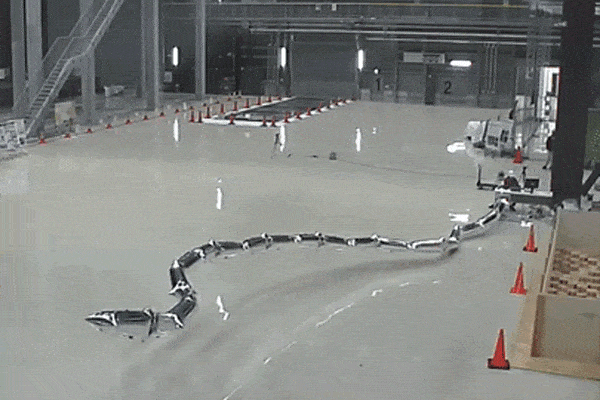This Super-Tall Robotic Arm Is Made of Helium Balloons
What’s bright silver, weighs next to nothing, and can reach up to the fifth floor? No, not an aluminum ladder. This inflatable robotic arm.
While most robot arms are trying to develop brains, this one’s gone on a strict diet. Unlike the robotic arms you might find in a factory, this device, developed by the Suzumori Endo Laboratory at the Tokyo Institute of Technology and discovered by IEEE Spectrum, uses a series of helium-filled balloons to form its arm. The use of balloons means that the entire 20-meter-long structure weighs just 1.2 kilograms—light enough for simple pneumatic artificial muscles to be used to articulate its joints from the ground.

There are some very evident drawbacks to the so-called Giacometti Arm—presumably named after artist Alberto Giacometti, who is famous for his slender, spindly sculptures depicting the human form. Its lightweight nature means that it would be easily buffeted by winds, for instance. It clearly can’t carry a great deal, either. And it’s only as resilient as its balloons.
But the researchers behind it suggest that because it’s so light and packable, it could theoretically be used for search and inspection tasks. It’s certainly plausible that it could be used in situations where it might be difficult to transport a heavyweight device, say, or where the use of a drone isn’t an option for battery-life reasons.
(Read more: “Japanese Robotics Giant Gives Its Arms Some Brains,” “Google Builds a Robotic Hive-Mind Kindergarten”)
Keep Reading
Most Popular
Large language models can do jaw-dropping things. But nobody knows exactly why.
And that's a problem. Figuring it out is one of the biggest scientific puzzles of our time and a crucial step towards controlling more powerful future models.
The problem with plug-in hybrids? Their drivers.
Plug-in hybrids are often sold as a transition to EVs, but new data from Europe shows we’re still underestimating the emissions they produce.
Google DeepMind’s new generative model makes Super Mario–like games from scratch
Genie learns how to control games by watching hours and hours of video. It could help train next-gen robots too.
How scientists traced a mysterious covid case back to six toilets
When wastewater surveillance turns into a hunt for a single infected individual, the ethics get tricky.
Stay connected
Get the latest updates from
MIT Technology Review
Discover special offers, top stories, upcoming events, and more.